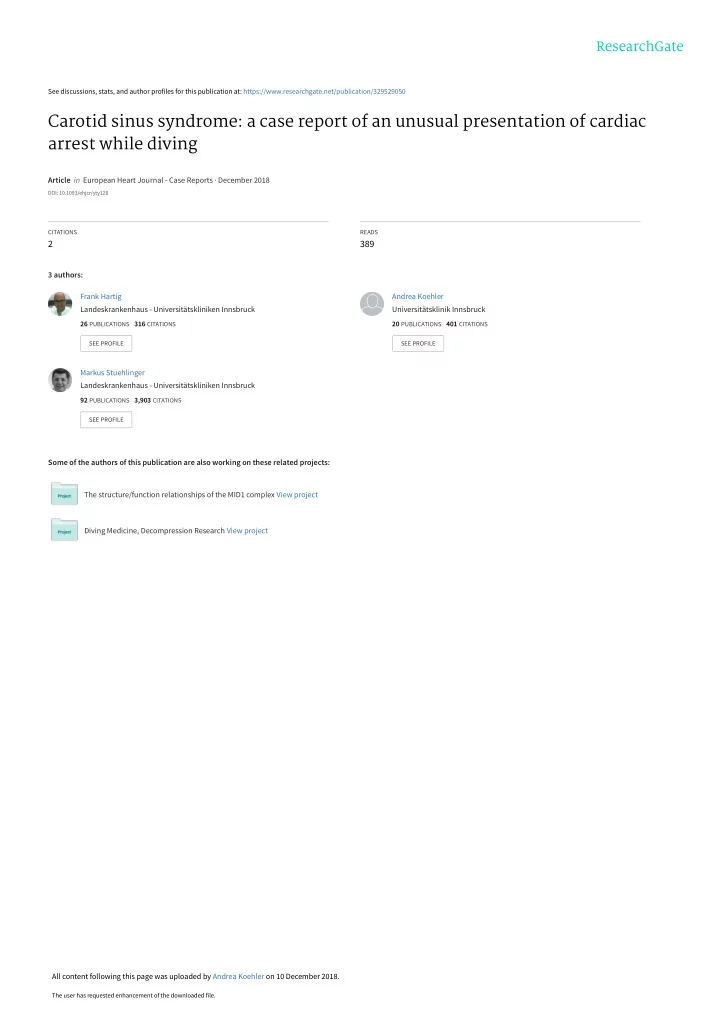

See discussions, stats, and author profiles for this publication at: https://www.researchgate.net/publication/329529050 Carotid sinus syndrome: a case report of an unusual presentation of cardiac arrest while diving Article in European Heart Journal - Case Reports · December 2018 DOI: 10.1093/ehjcr/yty128 CITATIONS READS 2 389 3 authors: Frank Hartig Andrea Koehler Landeskrankenhaus - Universitätskliniken Innsbruck Universitätsklinik Innsbruck 26 PUBLICATIONS 316 CITATIONS 20 PUBLICATIONS 401 CITATIONS SEE PROFILE SEE PROFILE Markus Stuehlinger Landeskrankenhaus - Universitätskliniken Innsbruck 92 PUBLICATIONS 3,903 CITATIONS SEE PROFILE Some of the authors of this publication are also working on these related projects: The structure/function relationships of the MID1 complex View project Diving Medicine, Decompression Research View project All content following this page was uploaded by Andrea Koehler on 10 December 2018. The user has requested enhancement of the downloaded file.
CASE REPORT European Heart Journal - Case Reports doi:10.1093/ehjcr/yty128 Carotid sinus syndrome: a case report of an unusual presentation of cardiac arrest while Downloaded from https://academic.oup.com/ehjcr/advance-article-abstract/doi/10.1093/ehjcr/yty128/5210469 by guest on 10 December 2018 diving Frank Hartig*, Andrea Ko ¨hler, and Markus Stu ¨hlinger Department of Internal Medicine, University Hospital Innsbruck, Anichstr. 35, Innsbruck 6020, Austria Received 13 May 2018; accepted 17 October 2018 Background Carotid sinus syndrome (CSS) is an exaggerated response to carotid sinus baroreceptor stimulation, which may re- sult in hypotension, prolonged asystole, and subsequently transient loss of consciousness due to cerebral hypoper- fusion. However, this commonly benign syndrome may have lethal consequences under certain circumstances such as scuba diving. ................................................................................................................................................................................................... Case summary We report the case of a trained 73-year-old male diver, who survived an almost fatal diving accident without any neurological deficits due to cardiac arrest under water. After recovery and intensive diagnostics in the local hos- pital, the origin of cardiac arrest remained unclear. However, after referral to our tertiary care centre CSS could be diagnosed by provoking syncope and asystole with carotid sinus massage (CSM). Consequently, a leadless pacing system was implanted and his medical diving fitness could then be recertified. ................................................................................................................................................................................................... Discussion In conclusion, CSS may be an underdiagnosed cause of loss of consciousness. Thus, screening for CSS by CSM should be included in medical exams in senior athletes and specifically in senior divers. � � � � � � � � � � � � � � � � � � � � � � � � � � � � � � � � � � � � � � � � � � � � � � � � � � � � � � � � � � � � � � � � � � � � � � � � � � � � � � � � � � � � � � � � � � � � � � � � � � � � � � � � � � � � � � � � � � � � � � � � � � � � � � � � � � � � � � � � � � � � � � � � � � � � � � � � � � � � � � � � � � � � � � � � � � � � � � � � � � � � � � � � � � � � � � � � � � � � � � � � � � � � � � � � � � � � Carotid sinus syndrome • Carotid sinus massage • Cardiac arrest • Leadless pacing system • Keywords Diving accident • Case report Learning points • Carotid sinus syndrome (CSS) may be an underdiagnosed cause of loss of consciousness with potential lethal consequences. • Carotid sinus massage should be included in medical examinations in elderly divers and athletes. • Asystole and syncope in cardio-inhibitory CSS can be prevented by cardiac pacing and a leadless intracardiac pacemaker is effective in CSS patients during scuba diving. * Corresponding author. Tel: þ 43 512 5048 1401, Fax: þ 43 512 5047057, Email: Frank.Hartig@tirol-kliniken.at Handling Editor: Flavio D’Ascenzi Peer-reviewers: Jelena Kornej and Domenico D’Amario Compliance Editor: Anastasia Vamvakidou Supplementary Material Editor: Peysh Patel C The Author(s) 2018. Published by Oxford University Press on behalf of the European Society of Cardiology. V This is an Open Access article distributed under the terms of the Creative Commons Attribution Non-Commercial License (http://creativecommons.org/licenses/by-nc/4.0/), which permits non-commercial re-use, distribution, and reproduction in any medium, provided the original work is properly cited. For commercial re-use, please contact journals.permissions@oup.com
Recommend
More recommend